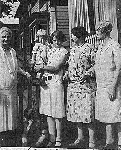 |
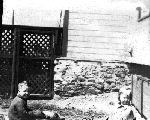 |
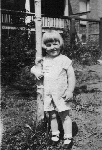 |
I was born on 11th February, 1928 in North Bay, Ontario.
Bad luck started early with me. My mother's water broke and they
did not expect me to live by the time she got to the hospital. Nurse's
called me the miracle baby for years. When I was three months old
I caught pneumonia. Once again it was touch and go. I waited
until six months before falling down the basement stairs and hitting my
nose against the corner of the basement wall. The basement was in
two sections with a join at the foot of the stairs. When I was two
years old I fell onto an iron frying pan being used as a toy in the back
yard. Of course I landed on my nose again.
 |
 |
 |
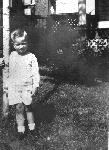 |
 |
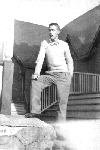 |
Even though it get very cold in the winter and North Bay gets
a lot of snow, that was my favourite season. I loved to skate, starting
about age 4, and to ski, starting about age eight to ten. The winters averaged
about 20 to 40 f below for most of the winter. Twice I saw it at about
54 below. I did not play hockey, just skated on the town and school rinks
doing stunts with my buddies and skating with the girls. The summers were
very warm and Lake Nipissing has beautiful beaches and water that is like
a warm bath. As you walked out the water would come up to the waist, and
then to the knees a number of times, because of sand dunes.
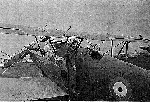 |
One day some friends and I were at the beach and we pulled a raft
out to a point where we could dive from it. Later as we pulled it
into shore, I was pushing it from behind. The water was about four
feet deep. I decided to swim under the raft and come up between the
fellows pulling at the front. When I reached about two thirds of
the way the raft passed over a sandbar. I couldn't go any further
forward and when I tried to scramble backwards the raft pushed me into
the sand. I started to panic. No one had seen me dive so they
didn't know that I was under the water. I finally somehow managed
to get back. When I got out I was too shaken and weak to even tell
the guys. I just stood there while they continued towards the shore.
I got my second flight in a small plane while serving on the carrier,
HMCS Magnificent, while we were in Portsmouth, England for a three month
refit. I made friends with a man who belonged to a flying club. He
invited me to go on a local flight with him. We flew over Portsmouth and
I asked if we could go over the Dockyard and see the Maggie. He replied
that we could not because it was a restricted area. Those were the only
two flights that I had in small planes until I learned to fly in 1969.
At age 16, in 1944, my job during the holidays was with the local soft drink company. They made coca cola primarily. I did many jobs around the plant and went as helper with a couple of the drivers. I learned to carry up to six wooden cases of pop at a time. On a couple of occasions I carried the six up three flights of stairs. My muscles got bigger and I got stronger.
When I finished with this job I went to visit my Uncle Frank (Link Trainer
Instructor) in Fort William, Ontario. On the way there the train stopped
at a station for a while. I got out to stretch my legs and saw two German
officers walking together on the train platform. They had the well known
long grey coats and shiny knee length boots. I did not see any guards but
I am sure that the to were being watched very carefully.
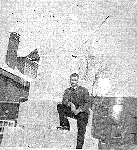 |
 |
The other picture shows an old girl friend, Bette Stuart. One day when
some friends and I were at the beach on Lake Nipissing, near a creek, we
heard some screams. Three of us ran out into the water where a girl was
in a panic. There was a four foot snake swimming near her. One of us grabbed
the snake and whip lashed it, and threw it across the creek. After that
she thought I was great.
As a deckhand one of my jobs was to grab a rope at the end of a long boom. The other end was attached to a 10 foot mast that held a short handle. A watchman would use this to swing me out. When we reached a raft that we were to tie to near Toronto, or going down the canal, I would run across the deck holding the rope and swing into space while the watchman pulled on the handle. Then I would slide down the rope and take the line cast to me to pull the ropes out and loop them around the bollards. A deckhand would tie a line to a rope and throw it up to the lock man so that he could pull it up and attach us to the bollard. Then as the ship rose the rope would have to be tightened by hand. The watchman did the same thing only with steel cables. He used a winch to tighten up his lines. One time while we were going through the Welland Canal we were told at one lock that that morning a watchman had put too much power on the winch. The steel cable snapped and cut the man in two at the waist.
As a watchman we stood six hours on and six hours off. My watch was from twelve to six. At times the off duty watchmen would leave the ship at Thorold, Ontario and catch it at the last lock. I often wished that I could go with them but the deckhand had to be there. When I became a watchman I decided that I wanted to try it. No one else wanted to go so I decided to go alone. While the water was out of the lock you could see a number of doors in the cement along both walls. The fellows would go through one of these as the ship was rising. There was a tunnel behind that ran the length of the dock. Every so far there was a circular stairway that led to the top. I jumped from the ship through one of the doors. It was dark in the tunnel and so I had to feel my way. I came to an opening and followed it. There were no stairs, just a rising in the cement floor, and this gradually closed up. I started to sweat and went back down the ramp. By feeling my way around the base I suddenly felt the stairs. By this time the water was sloshing around my shoes. I climbed the stairs but saw no light. It was really becoming frightening, especially since the water made a great deal of noise pouring in below me. Then as I neared the top I did see light and got to the ground above. I stood there until the ship came up and went aboard. I never tried that again.
The watchman was in charge of the deck hands and also relieved the wheelsman when he went for breaks or meals. The first time that I took the helm I was told the course that we were steering. It held for awhile and then came about a bit. I turned the wheel but it got worse. I was starting to get anxious when the First Mate came storming into the bridge and told me to look aft. There was our wake in the shape of a big circle. I had done a 360 degree turn. On the floating compass was a mark that was the head of the ship. To come back to course you have to bring the compass back to the head and I was trying to bring the head back to the compass point. I had no trouble after that. You learned that when given a course change you turned the wheel towards the new direction. About 10 degrees before coming on course you would swing the wheel to the opposite side and then as it settled on the correct course the wheel would be brought to midship. That would have the ship right on course.
On one trip we went to Cleveland, Ohio, and were docked beside a ship building area. They were building four cargo transport ships for carrying of supplies to Europe. I had a small camera and was on the poop deck taking pictures of them. Suddenly I noticed the workmen dropping their tools and yelling our way. The our Captain yelled at me from the bridge. I dropped through the hatch to my cabin and waited for the FBI to come after me for taking pictures of the ship building. Nothing happened and nothing was said, even from anyone on the Joan Virginia.
One time we were near Detroit at Grosse Pointe. Some of the fellows decided to swim across a little bay and small stream. They had seen a couple of girls there, in a park. They talked me into going although I was not that good a swimmer. It took all my strength and when I hit the current near the park shore I could make no headway. One of the fellows asked me if I needed help and I said "No". I was only a couple of feet from the shore but could get no closer and finally I just said "Get me". He jumped in, grabbed my bathing suit from the back and heaved up. I just lay half in and half out of the water for about five minutes.
On V.J. day we pulled into Toledo, Ohio. Some of us went ashore and hit the main streets. There were fires along all the streets in 45 gallon drums. Every guy kissed every girl that he met. We stayed ashore until about midnight.
Another time we were in Toledo and went downtown. For some
reason the ship was to leave earlier than expected. As we got back
to the oil yards we saw my Uncle Dorm coming ashore in a car to look for
us. He gave us a blast and as soon as we were aboard the ship sailed.
At one time we were to switch from carrying crude oil to light oil,
such as the old 3-in-1 house oil. We had eight huge tanks, four on each
side of the ship.
The first thing that we had to do was clean out the hoses, both the large and small. I was told to hold three small hoses, dangling into one of the tanks while gasoline was poured through them to clear out the oil. The gas spilled over my hand and was very cold. I used enough movement that the hose ends moved about and the brass fittings came into contact once in a while. The captain was standing nearby and he said to watch the movement. He asked, "Do you know where we will be if you cause a spark?" I said, "Some of us will be in Heaven and some in hell". We had to go into the tanks with steam hoses and wash them down. At the bottom of the tanks were built in, huge girders. We stood on these to use the steam. We would go down for fifteen minutes at a time, all that one could stand. One time when I hit the bottom the hose gave a huge back lash and I flew through the air and between the girders. I banged my head and leg. The next thing that I remembered was that I was climbing the ladder with one arm and dragging my leg. As I got near the top some of the fellows grabbed me and pulled me through the hatch.
Later some of the boys got together and decided that we should get extra
pay for the tank cleaning and they approached the First Mate and told him
so. We were refused so it was decided to mutiny until double pay was approved
for the period that we cleaned the tanks. We all agreed but then my uncle
Dorm, the Chief, took me aside and asked me if I was going along with the
rest of the crew. I told him that I was, because I didn't want to be the
only one refusing. He gave me an order, as my uncle, not the Chief, to
back down. I told the fellows that I would not go with them, and didn't
tell them why. As it turned out, the Captain had radioed to the owner about
the problem and the double pay was approved.
Later some of the fellows cornered me, and one told me that we were
going to go at it with fists. I told him that he could hit me all he wanted,
but that I would not hit him back. He asked why and I told him because
he had saved my life during the swimming session. The whole attitude changed
and we suddenly all became friends again.
Because of the war, and the fact that we were a tanker, when we reached
the canal we always went to the head of the line. It would only take a
few hours to get through the Welland Canal. Right after VJ day we had to
go to the end of the line and it took up to 24 hours to get through.
The handling of the equipment, ropes and hoses took strength and once
again I built my body up again.
When I returned home I attended Business College. As our course was ending three of the fellows approached me and said that they were going to join the Navy, and asked if I would go along with them. I loved my time on the tanker and agreed.
In time we got our notices to go to Toronto for check ups. By then two
had decided that they would not be joining. The third one and I went
and completed the physicals and other requirements. We returned home and
waited. When the call came I was the only one still willing to go, and
I did.